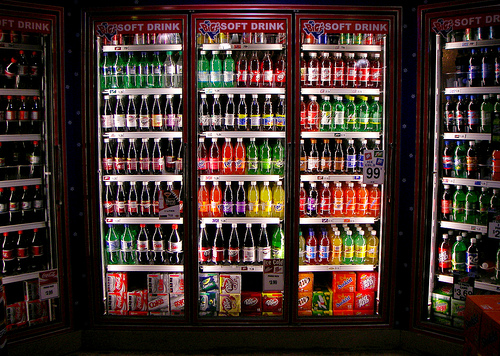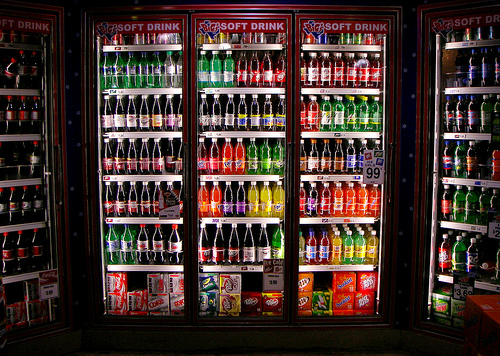 Feel free to stock up — there’s nothing stopping you.Photo: Matthew C. WrightOn Friday, the USDA rejected New York City’s proposal to restrict the use of food stamps to buy soda. According to The New York Times, there was much rejoicing:
Feel free to stock up — there’s nothing stopping you.Photo: Matthew C. WrightOn Friday, the USDA rejected New York City’s proposal to restrict the use of food stamps to buy soda. According to The New York Times, there was much rejoicing:
The decision was a victory for the soft-drink industry, which had lobbied against the proposal, and for advocates for the poor and underfed, who had argued that the government should not stigmatize them by taking away their right to shop like other consumers. The food-selling industry also contended that it would be too complicated for stores to have to program their registers differently in the city than elsewhere.
“It was a big deal not to start breaking up the programs,” said Jennifer Hatcher, senior vice president for government relations at the Food Marketing Institute in Washington.
Tellingly, the New York Times article noted …
… the thrill in the voice of Joel Berg, the executive director of the New York City Coalition Against Hunger who cheered the federal government for “deciding not to micromanage” the lives of poor people.
“The whole attempt was misguided and unworkable,” Mr. Berg said. “This proposal was based on the false assumption that poor people were somehow ignorant or culturally deficient.”
There are few issues that could put the soda lobby on the same side as the coalition for the hungry. Oh, wait. The massive federal Farm Bill does that, too.
Snark aside, this is a complicated problem. I’ve taken to the digital pages of The New York Times to argue in favor of restrictions similar to what New York City Mayor Michael Bloomberg proposed.
Yet it’s also true that restricting soda purchases represents an inelegant solution to the vexing problem of obesity. Still, it’s not as if the food stamps program doesn’t restrict what recipients can buy in other ways. For example, food stamps can’t be used for prepared foods, no matter how healthy they are.
Meanwhile, Sarah Kliff in The Washington Post went through the available data to conclude that a ban on use of food stamps to buy soda would be unlikely to meaningfully reduce obesity anyway. However, as she observed, 1) the USDA has never allowed it to be tried, so we can’t say with any finality, and 2) New York City has built an entire campaign around reducing soda consumption so perhaps as a part of a larger effort, it could make a difference.
That’s certainly my opinion. In fact, I’m convinced that the effect of such a ban would go beyond its simple economic effects. Any attempt to change American eating patterns has to deal with the overwhelming force of billions of dollars of food industry marketing and research designed to boost consumption of the very foods that contribute to the obesity epidemic. Updating dietary guidelines and releasing videos, no matter how peppy, won’t cut it. Restricting purchases of soda in federal nutrition programs would send a strong signal that the government just doesn’t think soda is good for you — and government needs to be able to speak loudly on this issue.
New York City’s main error, at least in terms of garnering support from anti-hunger advocates, was not in the proposal itself, but rather in failing to directly link the restrictions with positive incentives. Indeed, USDA Secretary Tom Vilsack reiterated his support for “incentives-based solutions” in a statement that accompanied the department’s rejection letter.
New York state already has a program that offers farmers market vouchers to low-income residents. Perhaps the way to “soften the blow” of food-stamp purchasing restrictions would be to pair them with more healthy food subsidies. Bloomberg himself could fund such a program — after all, he just personally bankrolled an anti-coal campaign to the tune of $50 million. Why not team with Wholesome Wave, the nonprofit spearheading healthy food subsidy programs, and present a more complete set of incentives?
Meanwhile, I think anti-hunger advocates need to take a broader view regarding restrictions on food benefits. We can argue about whether restricting use of food stamps represents “micromanaging” low-income Americans’ food decisions. But what is indisputably true is that, in addition to taxpayers supporting nutrition programs for the poor, they also support health care for the poor through the federal Medicaid program and, for the elderly poor, Medicare — both of whose budgets dwarf federal anti-hunger spending.
And while the relationship between income and obesity is perhaps more complicated than we’ve been led to believe, it’s still true that metabolic diseases like diabetes and hypertension are on the rise among the poor as well as the rich. And treating these diseases, which are chronic conditions, is expensive. It’s estimated that obesity causes almost $150 billion per year in additional health costs, nearly 10 percent of what this country spends on health care.
Unlike Medicare, which is paid entirely by the federal government, Medicaid spending costs are borne heavily by the states — and New York state has one of the highest Medicaid budgets in the country. It’s not unreasonable to think that Americans in various parts of the country may become more willing to sacrifice programs for the poor when faced with these realities. Heck, the GOP is ready to do it today!
With health-care costs threatening to bankrupt the country by mid-century and with obesity costs becoming a rising part of health-care costs, aggressive attacks on obesity — even through restricting purchases with food stamps — may be necessary to preserve public support for other, more expensive programs for the poor. And, of course, all this is happening at a time when the anti-hunger programs themselves are under increased pressure from Republicans.
New York City’s proposal was by no means a perfect solution. I would far prefer a universal federal excise tax on soda and sports drinks, including diet soda, which appears to cause diabetes at the same rate as regular soda. Is it unfair to single out the poor for these kinds of programs? It is. But that small kind of unfairness may be required to prevent an even greater one — the conclusion that we can’t afford to help the poor at all.


